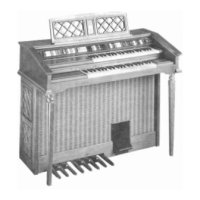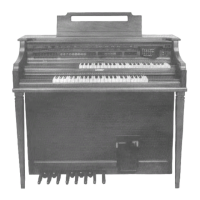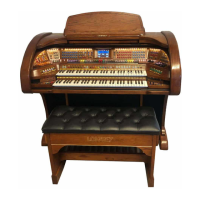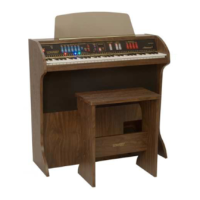Do you have a question about the Lowrey Majesty LX/510 and is the answer not in the manual?
Explains how to use the owner's manual and its structure.
Covers power, ABC's, pedal/music buttons, and reset functions.
Defines General Presets as pre-programmed sound setups activated by a single button.
Explains the operation of ten numbered preset buttons above the keyboard.
Guides on selecting and using General Presets with musical examples.
Describes Rhythm Presets as registration setups for orchestrated styles.
Explains pressing preset and style buttons to set up the organ.
Provides steps for playing songs with Rhythm Presets and styles.
Introduces 60 sounds from six categories, supplementing General Presets.
Details the two-step process of pressing a category and then a general preset button.
Offers guidance on using Category Presets for song-specific sounds or with orchestrated styles.
Offers 50 more preset sounds, used with General Presets and five Banks (A-E).
Explains the two-step process of pressing a Bank button and a General Preset button.
Guides on using Bank Presets for more sounds and saving custom sounds.
Introduces the section on orchestrated rhythm accompaniment patterns called "Styles".
Provides 144 orchestrated rhythm styles for accompaniment.
Explains how style buttons activate features like MCS for easy-play chords.
Guides on using Rhythm Presets with styles for introductions and playing songs.
Explains how three variation buttons create five distinct variations on each of the 24 style types.
Details how to press variation buttons before or after style buttons to hear variations.
Guides on referring to the style table and choosing musical styles.
Explains how these buttons control the amount of band accompaniment heard with a style.
Details how these buttons light up with style buttons and affect accompaniment.
Describes Auto Bass as an easy-play feature for bass pedal accompaniment.
Explains how Auto Bass 1 and 2 are activated and produce different bass patterns.
Guides on using Auto Bass for variety or playing manual bass pedals.
Provides an alternative drum pattern and sound for each rhythm style.
Explains that pressing Drum Variation adds a different drum pattern.
Guides on using Drum Variation for adding variety to rhythm styles.
Explains Intro/Ending for professional introductions/endings and FX for fill-ins.
Details how these features are used before, during, and after playing a song.
Guides on activating introductions, fill-ins, and endings.
Simplifies sound selection for orchestrated styles by picking complementary sounds and effects.
Explains pressing a Rhythm Preset button and a style button to ready the organ.
Guides on using Rhythm Presets for immediate good sound and making adjustments.
Allows easy-play one-finger or multi-fingered chords on the lower keyboard with pedals.
Describes MCS chord recognition and how style buttons activate it with magic lights.
Holds the last played chord after keys are released, aiding in turning pages or preparing next chord.
Explains Memory turns on with Rhythm Plus Orchestration styles and how to turn it off.
Guides on using Memory for smooth transitions between musical phrases.
Eliminates drum portion of orchestrated styles, muting other features.
Details how pressing Rhythm Only disables MCS, Memory, and Auto Bass.
Guides on using Rhythm Only with orchestrated styles and other buttons.
Starts or stops a Rhythm Plus Orchestration style.
Explains how the Start/Stop button functions with style selection and playing.
Guides on temporarily pausing styles without changing organ setup.
Controls the volume of the drum portion of an orchestrated style.
Details how to raise/lower volume using buttons and how levels are indicated by lights.
Guides on setting rhythm volume levels instantly via the keypad.
Controls the tempo or speed of an orchestrated style.
Explains how to increase/decrease tempo using buttons and how tempo is indicated.
Guides on setting tempo instantly via keypad and using tempo buttons as a beat indicator.
Offers a simple way to set rhythm style tempo by tapping a beat.
Describes the layout of the tab panel, detailing the multi-colored tabs for organ sounds.
Acts as master on/off switches for various tab sections on the organ.
Explains how tabs turn sounds on/off via illuminated red lights and how they are grouped by color.
Explains that orange Bass tabs control pedal sounds on and off.
Details how tabs are turned on/off and that Bass Sustain is adjustable.
Reminds users that presets automatically select pedal sounds.
Explains that Lower tabs turn sounds on and off for the lower keyboard.
Details how tabs are activated upon power-on/reset and how section volume is controlled.
Guides on using Lower tabs for beautiful lower keyboard sounds, noting presets combine them.
Explains that Upper tabs turn sounds on and off for the upper keyboard.
Details how tabs are activated upon power-on/reset and how section volume is controlled.
Guides on using Upper tabs for beautiful upper keyboard sounds and experimenting with Flute combinations.
Provides unique Theatre Organ sounds.
Explains that pressing tabs turns the sounds ON and OFF.
Describes specific Theatre Organ sounds like Reed, Diapason, and Vox Humana.
Introduces authentic orchestra and solo sounds playable alone or with organ tabs.
Provides additional sounds, primarily for right-hand upper keyboard play.
Explains how Upper On buttons activate sounds and how red/blue buttons select them.
Guides on simply pressing buttons for desired sounds and combining them with organ tabs.
Offers a selection of sounds for Orchestral and Solo sections, assignable to Genius buttons.
Explains how sounds are assigned to red (Orchestral) or blue (Solo) Genius buttons.
Guides on selecting sounds from a list and assigning them to Genius buttons.
Creates a smooth, gliding effect between notes in the Solo section.
Explains Portamento activates with the Whistle button and affects Solo sounds.
Guides on setting Portamento speed and using it with specific sounds like Whistle or Violin.
Adds an authentic repetition or repeating effect to sounds.
Details how Repeat works with Orchestral sounds and specific Solo instruments.
Guides on adding the repeat effect and setting its speed.
Adds touch sensitivity, like a piano, to Orchestral and Solo sounds.
Explains that striking keys harder produces louder sounds.
Guides on selecting sounds and activating Dynamic Keying for touch-sensitive play.
Changes the pitch of Solo (blue) and Orchestral (red) sounds by one octave.
Explains that sounds have preset pitches, and this feature reverses them.
Guides on using this feature to lower high-pitched sounds or raise low-pitched sounds.
These four buttons turn Orchestral/Solo sections on/off and determine keyboard source.
Explains how red/blue buttons and Upper/Lower On activate sounds and keyboard split.
Activates Glide/Sustain on Solo/Orchestral sounds or FX/Golden Harp.
Details how left/right foot switches are activated by foot movement.
Controls the volume level of red Orchestral and blue Solo sounds.
Explains volume buttons and how levels are indicated by lights.
Guides on adjusting volume and using the expression pedal.
Moves the sound (pitch) of the organ up or down at the touch of a button.
Explains how buttons above 'C' increase pitch, and below 'C' decrease it.
Guides on changing musical pitch for songs or playing along with others.
Introduces the Graphic Mixer for controlling Reverb, Sustain, and Volume levels.
Details how the mixer sets levels for Reverb, Bass, Orch Plus, Symphonic/Flutes.
Explains the Information Center displays Tempo, Chords, Keypad entries, and more.
Used for entering numbers to set levels, select features, and assign sounds.
Turns easy-play features (MCS, Memory, Auto Bass 1) on and off.
Allows easy-play features to be toggled with a single button press.
Guides on activating easy-play features with or without orchestrated styles.
Steps back in Keypad entry procedures to correct errors.
Implements Advanced Features or sets values after keypad entry.
Allows viewing lists of information like Advanced Features and Genius Sounds.
Explains how lists are displayed in the Information Center window.
Guides on navigating lists using Up/Down buttons and activating features.
Adds motion and texture to sounds using effects like Vibra Trem, Orch Trem, Chorus, Celeste.
Details how animation buttons modify sounds to create effects and moods.
Guides on using animation effects to change sound character, with an example.
Introduces Harmony Plus for simplifying right-hand play with automatic chords.
Adds multi-note harmony to single melody notes based on lower keyboard chords.
Explains the nine Harmony Plus selections and how they add harmony to melodies.
Provides non-musical sounds for flair and variety.
Explains that buttons are active only while pressed.
Guides on using sound effects by simply pressing buttons, with song examples.
Introduces Golden Harp as a feature for adding arpeggios to songs.
Features graceful arpeggios as background or accompaniment sound patterns.
Explains Golden Harp reads chords and functions with preset or selected sounds.
Guides on changing instrumental sounds for Golden Harp patterns using the Genius button.
Allows saving songs and registration setups onto 3.5" computer disks.
Explains saving preset information and recording information.
Details the process of formatting a disk for the organ.
Introduces the Music Recorder for recording, playback, and disk saving.
Records, stores, and plays back musical performances, with features like Pause and FF/Rewind.
Details storing notes, sounds, and effects during recording sessions.
Explains how to erase recorded tracks using the Erase button and Play/Pause.
Allows recording music onto a track that already contains a recording.
Explains how multiple recordings can be placed and merged onto a single track.
Guides on performing additional music to be recorded onto selected tracks.
Allows erasing only music recorded on the second track, leaving the first track intact.
Explains playback for disks recorded on the Majesty or factory produced.
Explains playback for Standard MIDI File or General MIDI disks.
Describes connections for headphones, microphone, and outputting sound to external systems.
Explains headphone/microphone jack locations and features, including volume control.
Introduces Advanced Features for customizing organ operation.
Explains Genius Features buttons activate/modify controls and effects without making sounds.
Details how pressing buttons turns features on/off, and cross-cancellation.
Performs many functions, including controlling overall organ volume and adding expression.
Explains how pedal position controls volume from minimum to maximum.
Guides on using the pedal for volume expression and adjusting maximum volume via Master Volume.
Activates specific features affecting sounds, like Glide/Sustain or FX/Golden Harp.
Details how left/right foot switches are activated by foot movement.
Guides on using foot switches for authenticity and freeing hands during performance.
Describes connections for headphones, microphone, and outputting sound to external systems.
Explains headphone/microphone jack locations and features, including volume control.
| Brand | Lowrey |
|---|---|
| Model | Majesty LX/510 |
| Category | Musical Instrument |
| Language | English |



